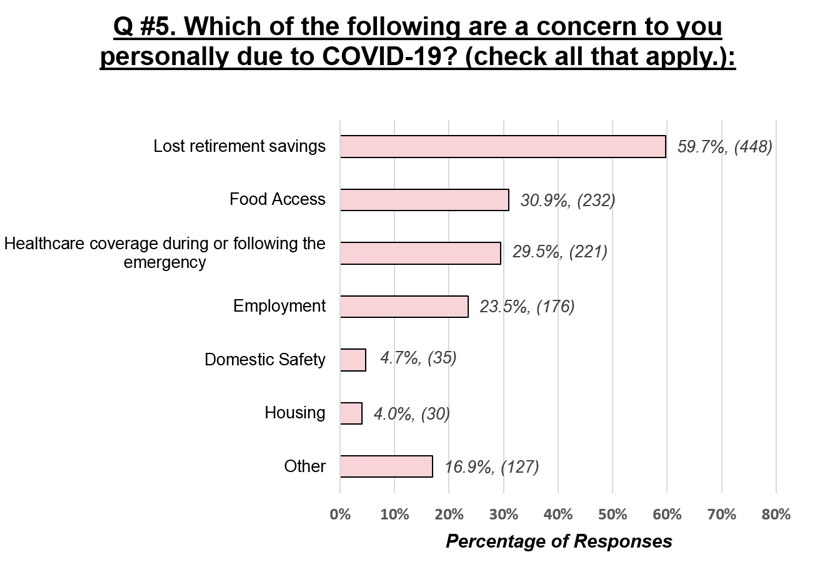|
Dear Friend,
I hope you're holding up alright as the corona siege continues. Results -- 750 completed questionnaires -- poured in from the survey my staff and I sent out last week. You'll find the numbers interesting, and I want to share them with you. (Lots of graphics coming up, so give this newsletter time to load.)
Take a look at the first set of responses.
One thing that pops out at me is the totality of public buy-in. Given the option to protest, "We've gone too far; the economic impact is not worth it," only 2% (18 respondents out of 747) answer "Yes."
So this is not a situation -- not around here, at least -- where rugged individualism and resistance to government authority fuels a libertarian impulse. Instead, there seems to be broad acceptance of the need for collective community action, not always a given in recent times.
Onto Q. 2.
The answers to Q. 2 worry me. Over 13% of our neighbors are either already at the point of financial, physical or emotional hardship, or figure they can go maybe two weeks before hitting trouble. One writes, "I'm a self-employed house painter and craft artist, so I'm being hit doubly. My in-person craft events are cancelled and my painting jobs ... are all deferring to later, which means I have no direct income right now."
And it's not just finances. A constituent writes, "For those who live alone, and who in other times had many outside activities, it's a serious problem to suddenly have EVERYTHING listed on your calendar canceled and X'ed out completely, with NOTHING left in your life.... I don't remember ever being so lonely before, even though I have lived alone for most of 20 years now."
Q. 3:
Here, on Q. 3, over 34% of our neighbors believe their coming down with the virus is unlikely and another 50% are only moderately worried. But that leaves 13% (95 people) who feel they or their loved ones are in peril.
One writes, "I've been told I have a possible exposure to COVID-19 and have mild symptoms, but we don't have enough tests for me to actually know."
Another worries
, "I have a daughter with disabilities who lives with a caregiver. I am concerned about what will happen if she or her caregiver become sick. I am high-risk (asthma); she can't come home."
Q. 4:
On vulnerabilities that relate to personal finance (see also Q. 2, above), additional governmental action is crucial. People who can't pay their bills now need immediate help. In the State Senate I'm pushing for moratoria on bill collection, utility cutoffs, tenant evictions, and mortgage payments. If relief doesn't come through voluntary action by banks, corporations, and landlords, and if the Governor can't or won't act via Executive Order, we should pass legislation to make relief mandatory.
Q. 5:

Whoa. All the responses to Q. 5 ring alarm bells. A huge number of respondents (60%) are seeing retirement savings erode. 31% are personally concerned about access to food; 30%, about access to healthcare; and 23%, about their jobs. A deeply worrying 5% (35 individuals) mention domestic safety, and 4% mention housing.
Seems to me that many -- certainly not all, but many -- of the fears reflected here relate back to finances. I'm pressing for government assistance to individuals in immediate financial danger. I want to extend help to for-profit and nonprofit businesses, too, but contingent on their continuing to pay their employees. Retirement savings depend on market conditions and are hard for state government to preserve directly, but stabilizing employment -- and thus stabilizing demand for goods and services -- will contribute directly to recovery in the markets.
Finally, Q. 6:
Local and state government come off looking OK here, but I'm concerned about excessive self-satisfaction. State government is the conduit for much of the new federal money that's been promised, so state agencies will need to shine on communications, applications intake, and the delivery of actual assistance. I hope we can keep up with demand. I promise you the Senate is monitoring executive branch operations and will legislate if we have to.
Keep me posted on how you're doing. Be safe and be well.
|